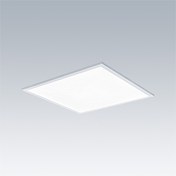Omega Pro 2 / OP2 3800-927-65 CKIT HX BC Q625
92920661
▼ Datenblatt
Eine LED-Paneel-Leuchte für Einbau/Anbau/Pendelmontage ausgeführt in Schutzklasse II, IP40_IP20, Schlagfestigkeit: IK03. LED-Treiber, Drahtlose Verbindung via App mit Bluetooth® 4.x - basicDIM Wireless. Gehäuse: Stahlblech, weiß (ähnlich RAL9016). Optik: UV-stabilisiertes Polycarbonat (PC), hexagonale Komfortoptik. Elektrischer Anschluß via 7polige Anschlussklemme, werkzeuglos zu bedienen, Durchgangsverdrahtung möglich. Komplett inklusive VCT-Technologie (variable Farbtemperatur), stufenlos einstellbar von 2700 bis 6500 K, DT8., Farbwiedergabeindex min.: 90
Funk Definition: basicDIM Wireless - Bluetooth® 4.x, Funk Frequenz: 2,4...2,483 GHz, Funk Sendeleistung: +4dBm.
Abmessungen: 622 x 622 x 57 mm
Leuchten Leistung: 39,8 W
Leuchten Lichtstrom: 3800 lm
Leuchten Lichtausbeute: 95 lm/W
Gewicht: 5,8 kg
- LED
- CE
- Einb_NDaeMat
- ENEC11
- GLedNr
- 650°
- IK03
- IP40_IP20
- LLedNr
- RG0
- SC2 - Schutzklasse 2
- Ta=0°C_to_+35°C

